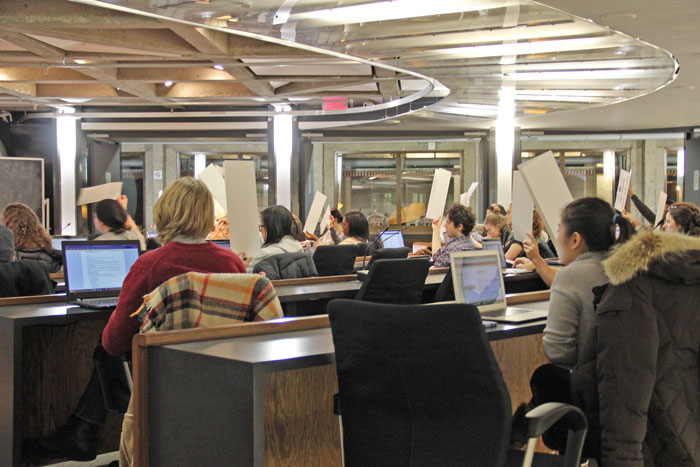McGill’s Arts Undergraduate Society (AUS) held a virtual debate on Feb. 4 for candidates running in the upcoming AUS elections to discuss student mental health, support for survivors of violence, and equity in the Arts faculty. Candidates running for the positions of President, Vice-Presidents (VP), Representative, and Senator outlined each of their goals for what they would hope to accomplish if elected.
The executive positions of VP Finance, VP External, VP Academic, VP Social, and Arts Representatives are uncontested. On the other hand, there are two candidates each up for the position of President, VP Internal and VP Communications, and six candidates competing for the two Arts Senator positions.
The polling period is open from Feb. 8 until the election results are announced on Feb. 10 at 6 p.m. Many of the candidate’s platforms included common themes such as increasing mental health support for students and ensuring equity and sustainability in the McGill administration’s practices.
Candidates discussed the improvements that need to be made to the McGill Student Wellness Hub as a more supportive system for students. Paige Collins, U2 Arts Representative and one of the candidates running for Arts Senator, called for better mental health services through increased hiring in the Wellness Hub and changes in deferred exam policies.
“If elected, I’d like to advocate for increasing the amount of licensed healthcare professionals that students can access,” Collins said. “Further, I’d like to advocate for change in McGill’s policy regarding missed exams and medical notes. Currently, to receive accommodations for missed exam[s], you need to provide a medical note that falls within a 24-hour window of when the exam took place. I’d like to advocate for a 48-hour window instead.”
Another key issue the candidates discussed is ensuring the safety of survivors of gendered and sexual violence. Aiden Starosta, U1 Arts student and candidate for Arts Senator, believes that McGill is not doing enough to protect survivors and prevent further violence.
“It should be a priority for students to feel safe at McGill, and that currently is not happening considering the very real and pressing issue of sexual violence on campus,” Starosta said. “To lessen the problem, I will fight for a reworked, in-person sexual violence course, a security app for students in res[idence], increased presence of emergency and phone booths on campus, and the implementation of a zero-tolerance policy.”
On the subject of equity at the university, Maddy Evans, U3 Arts and one of the candidates running for an Arts Senator position, spoke of the lack of diversity among McGill’s faculty.
“I hope to expand equity in McGill’s hiring practices for new professors and members of administration,” Evans said. “As of 2020 there were only 10 Black permanent professors at McGill among a faculty of over 1,700. I believe hiring more people of colour, Indigenous peoples, women, and other members of marginalized communities is incredibly important.”
Adin Chan, U3 Arts, and Alexis Zhou, U3 Arts, are both running for the position of AUS President. While Chan plans to improve current AUS infrastructure, Zhou’s anti-bureaucratic platform intends to revamp the AUS entirely.
“This upcoming election, we have an anticipated voter turnout of eight per cent, [which] means the vast majority of students, the 92 per cent, are excluded from what we’re doing here, and they’re no longer interested in our bureaucracy role-play,” Zhou said. “As student leaders, we have the responsibility to overhaul and reform the status quo […] Which is why under my leadership we will revise the constitution to make AUS the first non-hierarchical faculty association at McGill.”
Chan explained why he views bureaucracy as essential for student government as a system to monitor and regulate spending.
“The reason why there’s a lot of bureaucracy is not because we like paper,” Chan said. “It’s because we need to be very judicious about how we use the public’s funds. These are students’ money that is entrusted to these organizations that we need to be very careful with that clubs don’t use to embezzle.”







